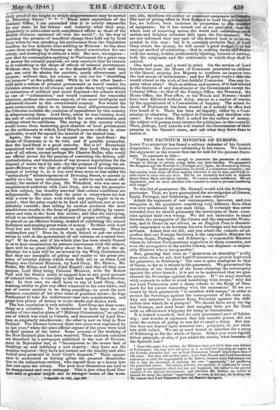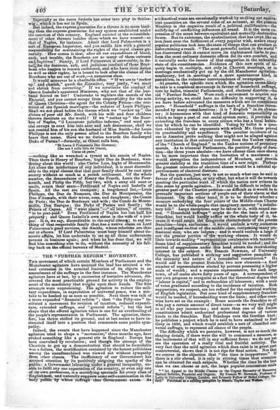THE FACTOTUM MINISTER OF EUROPE. LORD PALMERSTON has found a
solitary defender of his Spanish despatches ; the Examiner advancing to his rescue. We receive the argument as the utmost that can be said for the peccant Secre- tary. It amounts to this— England has been foolish enough to guarantee the possession of certain thrones in Europe to certain young ladies and their families: We guaranteed the Braganza and the Bourbon in [Portugal and i Spain, the Bavarian an Greec.e. . . . . The system of guarantees, no doubt, is a monstrous absurdity; sad this.country must shake off those existing whenever it can be done, and firmly re- solve never to enter into any more. But we are inevitably tied 'both as respects Queen Donna Maria and Queen Isabella. We cannot remain indifterent. We are implicated; and we must interfere with counsels in order:to prevent interfering with troops."
To this list of guarantees Mr. Disraeli would add the Schleswig guarantee. Thus, we have guaranteed the sovereignties of Greece, Spain, Portugal, and Schleswig, if not some others.* Admit the argument of our contemporary, however, and. you recognize in the guarantee something very different from what watt.ever understood by any such thing. It certainly was never intended that we should guarantee the sovereigns of those- coun- tries against their own wrong. We did not undertake to stand between the prerogative of the•Crown and the responsible Minis- ters, and to thrust in our advice, as an English Peer is theoreti- cally empowered to do between his own. Sovereign and her chosen servants. Admit that we did, and you admit the roductio ad oh- surdunt that our Foreign Secretary is the responsible Minister for Greece, Spain, Portugal, and Schleswig : a responsible. Minister whom no adverse Parliamentary majorities in those countries, nor even the prerogative of the native Crown, can displace—a respon- sible Minister who is irresponsible I But, granting that even so " monstrous an-absurdity " really does exist, then we ask, how Lord Palmerston so grossly neglected his guarantee in Schleswig? The case is quite analogous to -that of Spain, so far as it relates to-the guarantee. We guaranteed the succession of one branch of the house claiming the sovereignty against the other branch ; it- is not to be understood that we gua- ranteed the Sovereign against the people. If " we must interfere with counsels in order to avoid interfering with troops," why did not Palmerston send a sharp rebuke to the King of Den- mark for his patent tampering with the succession? If-we are bound by these guarantees " to interfere with troops," in order to protect the Sovereign against the consequences of his own acts, why not interfere to protect King Frederick against the diffi- culties into which he is plunged? We should drive away the big boy German, and send home that naughty little pet the Dane with an affectionate whipping for being so venturesome: It is indeed remarked, that we only guaranteed part of Schles- wig.; and wonder is expressed that any sensible person did not scout the notion of going to war for so small a thing. But jus- tice does not depend upon material size; principles do not °soil? late with values. We are as much bound to interfere for a scrap of Schleswig as for the whole of Spain. Either you-must rigidly follow principle, or else, if you admit the merits, what becomes of
the Spanish case •
Since this paper was written, the Ministers have put forth their own defence in Parliament; but they have not given to it so bold and imposing an aspect as the friendly journalist had, nor as Lord Palmerston himself might have done if left alone. Bat they add another point: Lord John Russell and Lord Lansdowne endeavour to shift the responsibility to Mr. Bulwer, because Lord Palmerston had left to him the discretion of. choosing his own " opportunity " for proffering the prescribed advice. The advice, however, was general; it could not be meant to apply to contingencies which had not yet happened, but rather to the general conduct of the Spanish Government; and therefore Mr. Bulwer can hardly be blamed for using the earliest "opportunity," or even, in his zeal, for making one. We observe that Lord Palmerston does not disavow ids agent. Especially as the casus fcederis has come into play in Schles- wig; which it has not in Spain.
But indeed, the express guarantee for a throne is no more bind- ing than the express guarantee for any system established under the sanction of this country. England assisted at the reestablish- ment of other thrones besides those which we have named—at that of Naples, for instance. Admit that Lord Palmerston is a sort of European Imperator, and you saddle him with a general responsibility for maintaining the rights of the royal classes ge- nerally. How comes it that, after all our expenditure of blood, cash, and trouble, the Bourbons are so many of them outcasts and, fugitives! Surely, if Lord Palmerston is answerable, in de- tail; for the decorous, safe, and judicious conduct of those Bour- bons who happen to remain enthroned, and who have their duties as well as their rights, he is bound to look after the claims of the Bourbons who are out of work,—a numerous class.
It would moreover be a charitable office. " If we are to cocker up' and cherish," quoth the Examiner, very justly, "we must not shrink from correcting." If we scrutinize the conduct of Queen Isabella's appointed Ministers, why not that of the hus- band foisted on her? Undertake to regulate the morals of the Escurial, and you cannot escape from responsibility for the acts of Queen Christina—the agent for the Coburg Prince—the con- triver of the Spanish marriages—the seducer of Louis Philippe. Shall we not plead before the throne which we "cocker up" the claims of poor old lbfr. Smith, with his wife and four children thrown destitute on the world ? If we "cocker up" the Bour- bon of Naples, "il Lazzarone paladino infermo," and send spe- cial envoys to coax him into sane and safe demeanour, shall we not remind him of his son the husband of Miss Smith—for Louis Philippe is not the only person allied to the Bourbon family who bears that name. Have we no duties towards the discharged Duke of Parmat—formerly, as Giusti calls him,
"Di Lucca it Protestante Don Giovanni; Cho non e nella lista del tiranni,
Came ne pesce,"
—nothing like so wretched a tyrant as his cousin of Naples. Then there is Henry of Bourbon, bight Due de Bordeaux, wan- dering about this world : also Carlos Luis, hight of Montemolin. Let alone the misfortunes of any individual, it is most discredit- able to the royal classes that that poor family should be cast upon society without so much as a parish settlement. Of the whole number, the descendants of Henry the Fourth, Louis the Four- teenth, and Philip the Fifth, but two, with a stray old aunt or uncle, retain their seats—Ferdinand of Naples and Isabella of Spain. All the rest are trampers ; a lengthened list,—Louis Philippe, the Due de Nemours, the Due de Montpensier, the Due d'Aumale, with their wives, sons, and daughters; the Comte de Paris ; the Due de Bordeaux and wife;- the Conde de Monte- man, Don Enrique ; the Duke of Parma and family; the Prince of Capua. All " want places "4‘fall letters," of course, " to be post-paid." Even Ferdinand of-Naples has lost half his property ; and Queen Isabella's own sister is the wife of a pau- per. It is, we say, discreditable to the royal classep ; to say no- thing of that respectable family that has a native claim on Lord Palmerston's good services, the Smiths, whose relations are thus out at elbows. If Lord Palmerston must busy himself about do- mestic affairs, let him undertake to set up all those unfortunate persons in business again ; and when he has done that, we will find him something else to do, without the necessity of his fall- ing back on the official bureaux of Madrid.



























 Previous page
Previous page